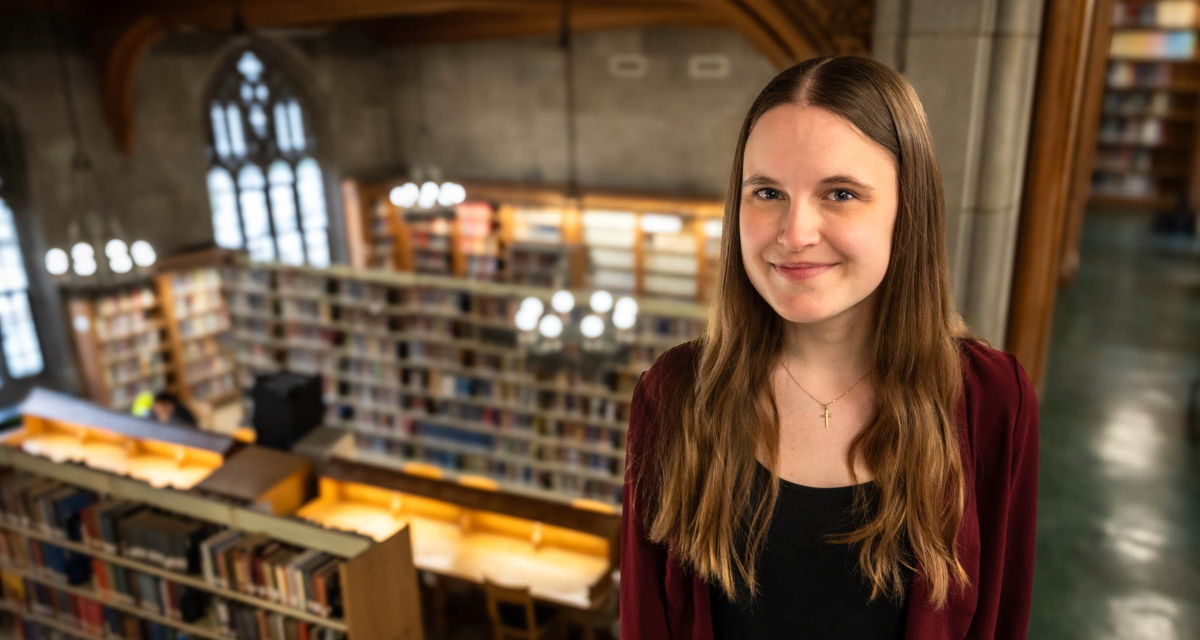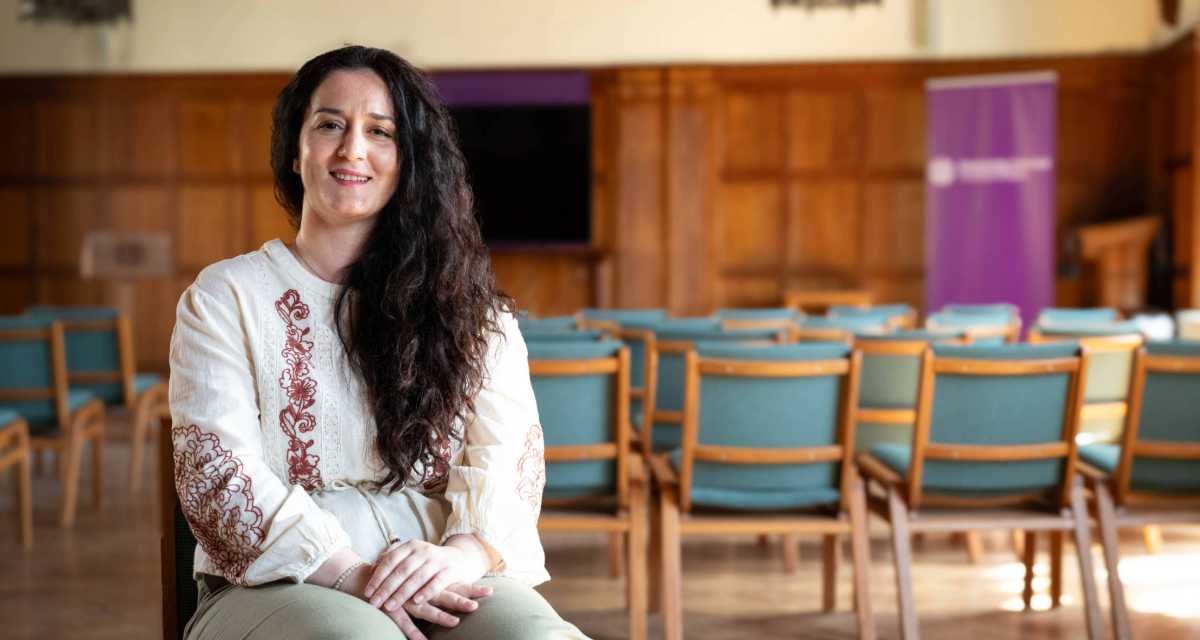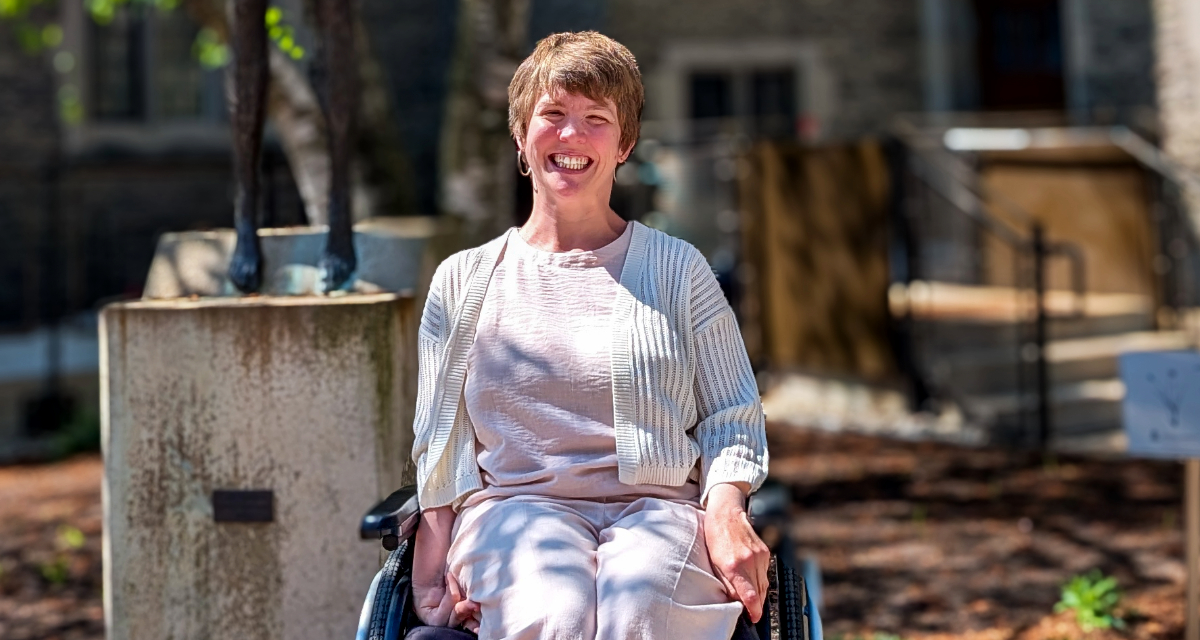Meet Emmanuel College’s Class of 2025
By Dan Blackwell
What draws someone to Emmanuel College? For the Class of 2025, it was often a deep question of identity, purpose or calling. At Emmanuel, future counsellors, chaplains, pastors, psychotherapists and spiritual caregivers are shaped by interfaith dialogue, rigorous study and a shared commitment to serving others.
Meet some of the inspiring graduates of Emmanuel College’s Class of 2025.
Kacy Lin

Kacy Lin has never forgotten what her friend’s grieving father said. At the funeral, he expressed one heartbreaking regret: he wished he could have held his daughter as she died. Instead, her final moments were spent surrounded by machines, undergoing invasive, last-ditch efforts to save her. That moment stayed with Lin. She began volunteering in hospices, driven by a question that wouldn’t let go: How can we die feeling more supported, more loved and more safe? This question propelled her on a journey of spiritual exploration that has culminated in the completion of her Master of Psychospiritual Studies in the Christian focus at Emmanuel College.
Lin, who now works as a spiritual care practitioner at Princess Margaret Cancer Centre, supports patients and families, many of whom are undergoing bone marrow transplants and cancer treatments. She came to Emmanuel College with a background in Buddhism but chose to pursue the Christian focus, drawn to the college’s interfaith approach.
“I grew up learning and practicing Buddhism, and while I haven’t left that behind, through personal experience and my studies at Emmanuel, I’ve embraced a blended spiritual identity,” she said. That blend, and the college’s engagement with diverse religious frameworks, has strengthened her ability to support patients who came from diverse spiritual and cultural backgrounds.
"One thing that comes up as people approach the end of their lives is this question of what comes next: Will I go to heaven? Have I done enough?” said Lin. “For some, the relationship with God can feel deeply contentious, as they feel abandoned in their last days. I found myself curious. What had they learned, and why was this story so powerful for them and how could we begin to reframe it to offer hope, create space for compassion and help them find forgiveness and reconciliation within themselves?"
Lin said that in addition to her work with cancer patients, she is working to expand into private spiritually integrated psychotherapy.
“At Emmanuel College, learning different religious frameworks gave me more opportunities to understand people,” she said. “For me, at the heart of interfaith theological education is the question: how does faith support us? How does it inspire us to become more kind, more honest and more vulnerable—regardless of our tradition or upbringing?
Rowena Hetherington-Wilson

“Am I too young to be a minister?” That was the question Roewna Hetherington-Wilson, 26, asked herself three years ago as she began the Master of Divinity program at Emmanuel College. Most of the ministers she knew were closer to retirement than college age. But now, with her master’s degree complete, she’s preparing to begin a full-time placement as an ordained minister of the United Church of Canada this September. The Guelph native says her time at Emmanuel helped confirm that she was making the right decision.
“At first, I was a little nervous about going to Emmanuel College, but it ended up being the space where I gained the most confidence in my own sense of identity and my own spiritual tradition,” she said.
As part of the Spiritual Life team, a course at Emmanuel College that aims to prepare our students to lead in public, Hetherington-Wilson helped organize a weekly spiritual gathering alongside peers from Christian, Muslim and Buddhist streams. These spiritually focused events featured music, prayer and experiential activities that encouraged collaboration and shared worship across faith traditions.
“There’s something powerful in interfaith learning and bringing together the unique focuses of each tradition,” she said. “The ability to truly listen to others—something I practiced at Emmanuel College—is a skill that translates across so many contexts.”
As she steps into ordained ministry, Hetherington-Wilson sees an opportunity to make a difference, even as polarization shapes the world around her.
“We can still show up together amid our differences,” she said. “And that’s vital in a world that often turns away from that possibility. I hope to carry that into the workspaces I’m in—choosing not to live in fear of difference, but to embrace it. Because meaningful connection across difference is truly possible.”
Ema Rado
Ema Rado’s early exposure to diverse faith traditions shaped the spiritual journey that led her to Emmanuel College. Born and raised in a Muslim family in Albania, she briefly explored Christianity before ultimately embracing Islam. That path naturally led her to Emmanuel’s interfaith learning environment, where she pursued a Master of Psychospiritual Studies (MPS) in the Muslim focus.
“Being in community with people of different faiths and challenging myself to articulate my own beliefs—why, for example, we pray five times a day—actually strengthened my connection to my own faith,” Rado said.
Rado spent part of her MPS practicum at an addiction management facility at Lakeridge Health hospital in Oshawa, providing “spiritually integrated” psychotherapy to patients from various backgrounds and religious beliefs.
“These are people that have the ability to rewrite their story, and they are interested in the big questions about faith and meaning,” she said. “We challenged them to think about what is sacred in their life, and how they make meaning of things. It was open to them whether they wanted to connect it with God.”
With Rado’s sights set on continuing her studies this fall at Emmanuel through a Master of Theological Studies and, eventually, a PhD, she says her time here has been invaluable, largely because of the opportunity to learn from people of diverse faith backgrounds.
“That’s why, even as I look ahead, I keep returning to interfaith work, because it offers a way to experience difference without division and to move together toward peace. In my own tradition, the highest goal isn’t happiness—it’s peace. And I believe that’s what people are truly searching for.”
Justin Appler
Justin Appler was ready to leave religion behind. Raised in a fundamentalist household and later coming out as a gay man, he had long assumed that religion had no place in his future. By the time he’d earned degrees in history and political science, Appler knew something was missing. He longed for a path rooted in compassion, service and faith. Thanks to a timely conversation with an Emmanuel College alumni/ae, Appler found the Master of Psychospiritual Studies. Even before graduation, he was already balancing private practice as a psychotherapist with a part-time role as a spiritual care provider at Toronto’s Hospital for Sick Children.
“The work I do at SickKids is really about meeting with people, often parents, in their moment of crisis and giving them the space to reconcile what's going on,” he said. “We’re not trying to fix everything, we’re really just kind of letting them settle into what's going on and creating a place where it's safe enough to do that.”
The work is emotionally intense, but Appler said his training and faith have helped him navigate the day-to-day realities of his work.
“There are definitely days when I carry the weight of what I’ve witnessed,” he said. “But the training gave me tools to process that—to recognize what’s mine to hold and what I need to let go of.”
Appler brings an interfaith lens to his work. A self-described practitioner of Christianity, Buddhism and Hinduism, he tailors his approach to meet the spiritual needs of each family. For Hindu families, that might mean leading puja worship rituals with fruit, chants and candles. For others, it could be mindfulness meditation or simply holding space. That interfaith approach was nurtured at Emmanuel College, where classes in Buddhist psychology and spiritually integrated care helped him build the foundations of his practice.
“Emmanuel College taught me to respect that while I may hold one belief, others may be on different paths, each with their own unique perspectives,” he said. “I was fortunate to work alongside Buddhists, Christians, and Muslims—each of us bringing our own faith backgrounds but finding common ground.”
Whether in private practice or providing spiritual care, Appler feels equipped to support people from all backgrounds and beliefs. His training at Emmanuel has helped him understand that psychospiritual care must be fluid, adaptable and deeply responsive to each person’s unique story.
“The nice thing about Emmanuel College is that it doesn’t pretend the work ends when we earn our degree," he said. "This work keeps evolving—and the beauty of interfaith learning is that our model might be set aside tomorrow to make space for a new way to support our community.”
Miriam Spies

Miriam Spies is reshaping how the church understands ministry and inclusion by centering the experiences of disabled leaders. A decade after earning her Master of Divinity from Emmanuel College, she has completed a PhD that challenges traditional church leadership models and invites communities to embrace ministry with all bodies.
Her doctoral work emerged from not seeing herself reflected in those traditional models. Grounded in incarnational theology—the belief that God is in solidarity with human bodies through the body of Jesus—her research explored how physical bodies, especially “crip” bodies or those marked by disability, shape the way ministry is practised. The term “crip” is used both as a noun, expressing identity and political commitment, and as a verb, challenging ableism, she said.
“I felt there was a need for further reflection and study around being a minister with a disability—or a crip minister, as I have come to claim,” she said.
At the heart of her doctoral research is a theological exploration of what it means to minister from and with a disabled body.
“Rather than trying to convince folks that I serve in ministry the same as my able-bodied peers, I now have language and imagination to help people envision being in ministry with me—and with all of our diverse and beloved bodies,” she said.
During her studies, Spies served as an assistant for the college’s interfaith Spiritual Life course. She said the experience of learning alongside students from different traditions deepened her own spiritual practice and reaffirmed her belief that community—and justice—must be at the centre of theological education.
"At Emmanuel, students across faith traditions come together to practise interfaith dialogue—learning from one another’s beliefs while also deepening their own spiritual practices," she said.
Spies is turning her dissertation into a book and continuing her work with the United Church of Canada. This summer, she will teach in the Doctor of Ministry program at St. Stephen’s College in Edmonton and chair the worship committee for the church’s General Council. In the fall, she will travel to Thailand as a Bible study leader at the World Communion of Reformed Churches’ Assembly.
“My time at Emmanuel College has been shaped by deep mentorship, community support and rigorous theological exploration,” she said.
“I’m leaving with work I’m truly proud of.”
Emmanuel College, part of Victoria University in the University of Toronto, is one of the most respected theological schools in North America. Graduates go on to serve as ministers and faith leaders in their communities and as spiritual care practitioners/chaplains in military, hospitals and prisons. They also offer mental health supports to some of the most vulnerable members of society as psychotherapists who integrate spirituality into their practice. Doctoral graduates of Emmanuel serve in academic institutions across the world and are considered leading academics in their fields.
